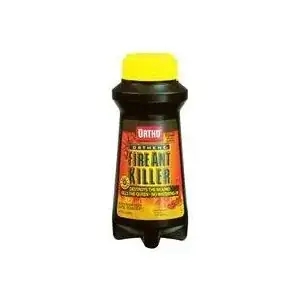I live in Houston, TX, USA and fire ants are a nearly year long concern. I have had success treating mounds with Orthene as they appear.

However, I had a Siberian Elm in my backyard that was infested with fire ants and I never managed to kill the colony. I could suppress it for a bit, but I would see a new mound within days. Not long after I started treating the tree and mulch around it regularly, it died (I've removed it since). It was near the end of it's lifespan (likely 30 years old).
Now I have a colony just starting up on a tree in my front yard (likely an elm as well, though it's much bigger than the other). In addition, my two year old loves this tree and plays around it constantly.
Here are my questions:
Can Orthene harm my tree? Even over repeated dosages (a few tablespoons a month)?
Is there a better pesticide that is less likely to harm the tree and my child? The Orthene is effective, but it is quite nasty.